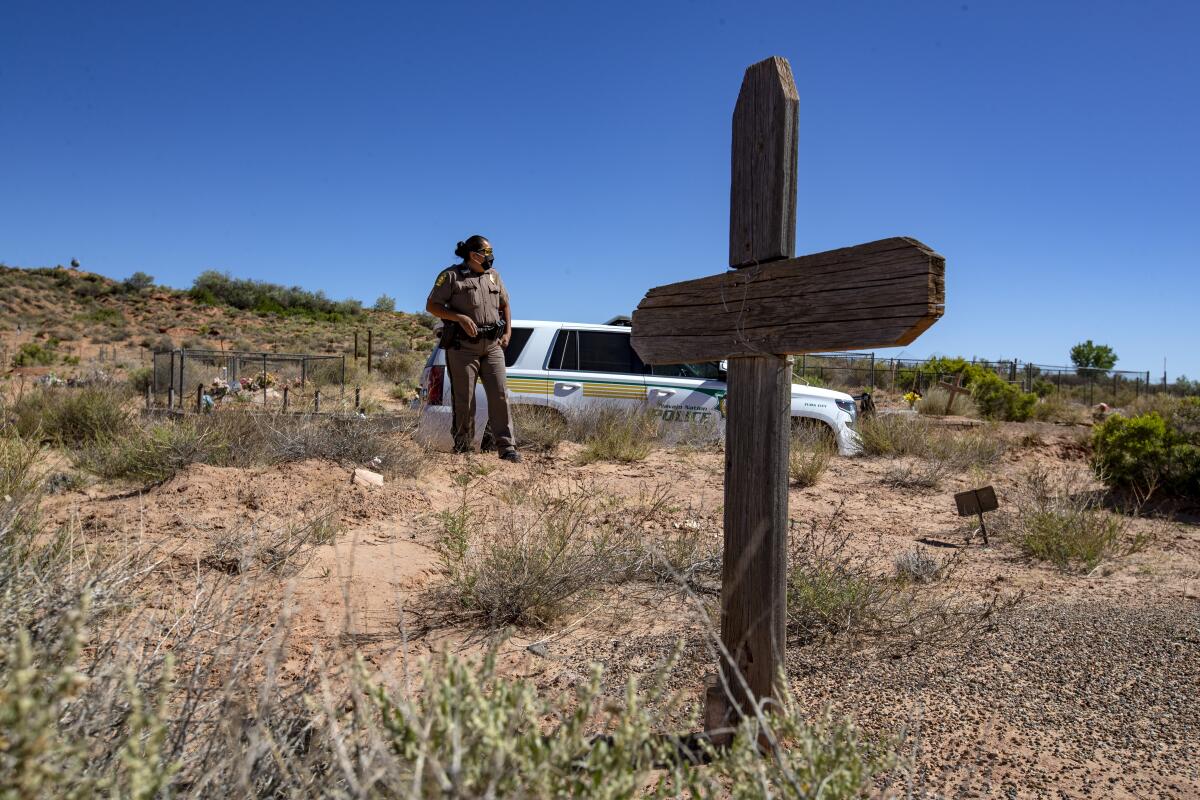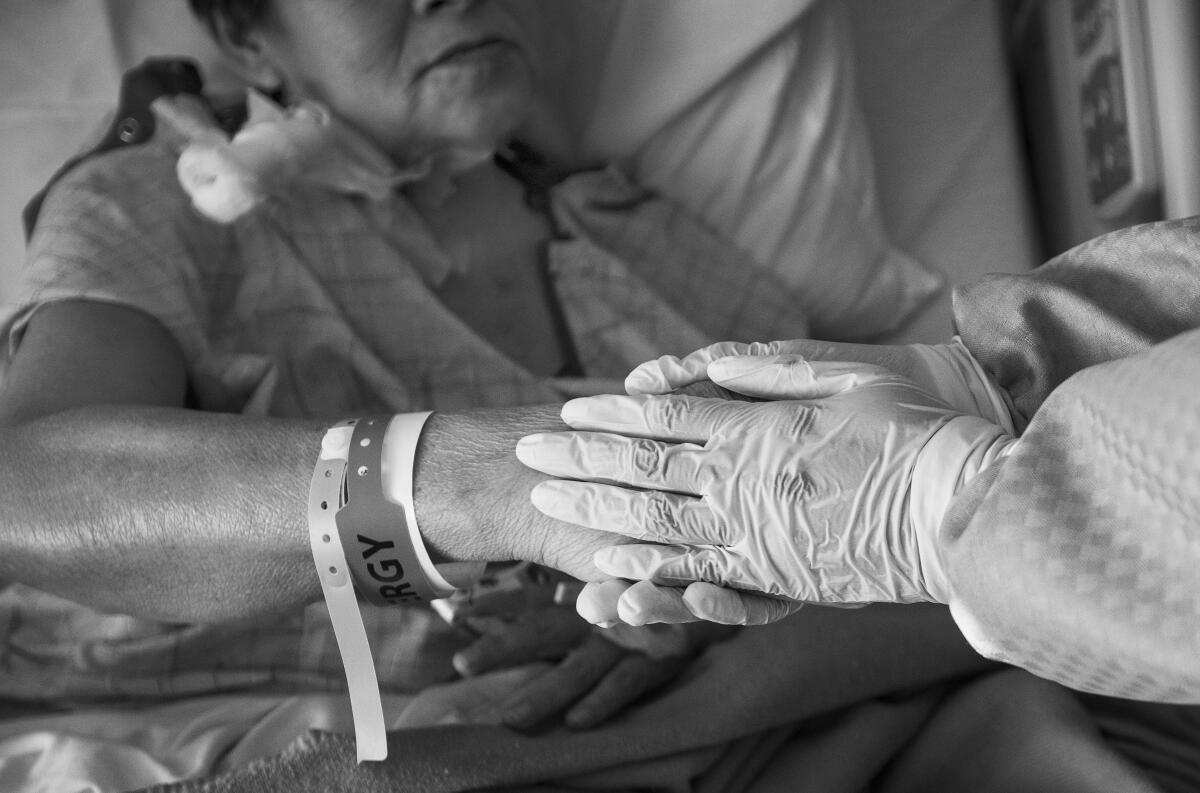Coronavirus Today: L.A.’s antibody mystery
Good evening. We’re Diya Chacko and Sam Schulz, and it’s Friday, June 5. Here’s the latest on what’s happening with the coronavirus, plus ways to spend your weekend and a look at some of the week’s best stories.
California has signaled that counties may be allowed to start reopening gyms, day camps and bars as soon as next Friday. Film and television shoots can resume then, too, subject to county public health officers’ approval. But even as the state reopens, there’s a mystery at the heart of its pandemic: How many people have been infected?
Controversial studies out of Stanford University and USC in April suggested the virus had circulated much more widely than previously thought in Silicon Valley and Los Angeles County, leading other epidemiologists to question whether those estimates were too high. Then in May, the same researchers from USC and L.A. County repeated the study with a new group of people. They got dramatically different results, suggesting only half as many people in L.A. County had antibodies.
More studies are needed to understand how widely the coronavirus has spread, but what to make of the changes between those two is the subject of much debate. It’s possible that people’s antibodies could be declining months after recovery and are no longer detectable, although that’s speculative. Then there’s the fact that the newer study made a concerted effort to test more Latino, Asian American and black Angelenos, which may have produced more accurate results. If the new study is indeed closer to the truth, the virus’s fatality rate might be higher than earlier thought, the study’s leader said.
The coronavirus is killing black people at twice the rate as white people — the result, L.A. County Public Health Director Barbara Ferrer said, of “racism and discrimination, and how it limits access to the very opportunities and resources each of us need for optimal health.” So how do we stop COVID-19 from disproportionately killing black people? There are no easy answers, but the health experts we asked had ideas for where to start: Name the issue, protect essential workers, make testing accessible for all and fight for social justice.
One such inequity was plain in Friday’s federal jobs report. Its headline numbers were unexpectedly positive, with overall unemployment falling to 13.3% in May. But for black Americans, it was more bad news: A staggering 16.8% of the black labor force was out of work, up slightly from April. In California and nationwide, the coronavirus is widening the racial divide between haves and have-nots, and the pandemic-driven economic meltdown has helped to inflame the black community’s deep sense of injustice.
Black entrepreneurs face a unique bind, too. Anthony Suggs bought a food truck to rebuild his life after spending time in prison for selling marijuana. He sees food as an opportunity to promote unity amid the coronavirus shutdown and protests. It’s a hard vocation for anyone, especially during a pandemic, but Suggs finds himself in a particular dilemma: He’d like to feed protesters but doesn’t feel safe going out. “It’s draining my pockets,” he says of the business, called Antidote Eats. “I’m trying to ride it out.”
By the numbers
California cases and deaths as of 5:29 p.m. PDT Friday:

Track the latest numbers and how they break down in California with our graphics.
What to read this weekend
Reimagining our indoor spaces. Whither the open office? How can we make homes airier and greener? And where should we park our cars? We asked the experts how the pandemic will change architecture. Now is the time, one says, to ask “the big metaphysical questions” — and consider the nuts and bolts. For instance: Is this the death of the doorknob?
Standing up for each other. “As an Asian American during the xenophobic times of COVID-19, I was defended by African American brothers and sisters. It was my duty to defend them, too, during these heinous times.” That’s what one Angeleno told The Times when we asked readers why they are protesting and what they hope to achieve.
“I was looking forward to my daughters having my last name.” Thousands of California foster families’ adoption plans were thrown into chaos as courts closed. Foster parents say they’re used to being patient. But they worry how kids whose lives have been marked by transience will internalize the delays in finalizing adoption, the pinnacle of stability.

I hope I am not exposed today. She’s patrolled the Navajo Nation for nearly 20 years, but nothing prepared Officer Carolyn Tallsalt for the COVID-19 outbreak spreading through the dry, remote 27,000-square-mile reservation.
“Who’s to say we’re not family?” What began as a home school during stay-at-home orders has become a kind of coronavirus commune, as three families quarantining together depend on each other to stay healthy and safe.
When a city brimming with live music went dark. Los Angeles is only beginning to process the loss — economic, cultural and personal — that occurs when venues close, artists move away and scenes struggle to stay in touch. The Times spoke with owners, staff and performing artists at four prominent independent clubs about the night of March 11.
A look at how Las Vegas has changed. Bright lights. Ringing bells. And now, sneeze guards at blackjack tables, mandatory empty barstools and a dancing bartender in a bikini and face mask. After a shutdown of 78 days, gambling resumed at 12:01 a.m. Thursday in a very different Las Vegas.
Your support helps us deliver the news that matters most.
What to do this weekend
Read books about black lives. From poet Claudia Rankine’s “Citizen” to Mikki Kendall’s “Hood Feminism,” Lorraine Berry recommends 13 essential works of nonfiction as a starter syllabus of the black experience. Need a preschool-level starter syllabus? We talked with Ibram X. Kendi, the author of a new board book about for toddlers, about how white parents can raise antiracist babies. You can pick up your copies at one of these 22 L.A. bookstores that need the support.
Celebrate Pride. First L.A. Pride was canceled; then it was turned into a Black Lives Matter solidarity protest march set for next weekend. In the meantime, here are some ways to celebrate Pride amid the pandemic and the protests, and here’s what to watch to honor the LGBTQ movement’s protest roots.
Celebrate a decade of theater. In a world without a pandemic, the Tony Awards would have been held this Sunday. Our theater critic Charles McNulty has a fun alternative: his own awards — call them the Charlies — honoring the best of Broadway’s last 10 years. See if you agree with his picks.
Get outdoors close to L.A. You have ever more options. Parking lots that had been closed at many California state parks have reopened. Eaton Canyon in Pasadena reopens Saturday, but you’d better make a reservation. From the region’s trails to its beaches, we’ve compiled the latest on what’s open and what’s not. You can sign up for our forthcoming newsletter The Wild for more.
Get outdoors in the Sierra. Most of California’s 11 national parks and recreation areas are now at least partly open or about to be. Yosemite is letting those with permit reservations hike up Half Dome, and at Sequoia and Kings Canyon, giant sequoia groves and the backcountry have reopened. But Mount Whitney trails are still off-limits even with a permit.
Get artsy outdoors. Bruce Munro’s superbloom of thousands of solar-powered stemmed lights has wowed visitors in a Paso Robles field for more than a year. His art installation “Field of Light at Sensorio,” closed in March, reopens next week.
Get cooking. You really don’t need any fancy equipment, as cooking columnist Ben Mims’ inventory of his favorite kitchen tools shows. Whether you need fuel for a protest, a hike or a workout, our easy-to-make fruit-and-nut energy bars will provide it. Get more from Our Food team’s weekly newsletter.
Let somebody else do the cooking. Turn to our list of more than 200 black-owned L.A. restaurants, cafes, coffee shops, food trucks and pop-ups — or order desserts and other foods from these other black-owned companies. Get our critics’ Tasting Notes newsletter for more recommendations.
Listen to a podcast. Try “Coronavirus in California” for dispatches from the front lines. If you’d rather take a mental break from the crisis, check out our new podcast “It Was Simple: The Betty Broderick Murders,” written and hosted by columnist Patt Morrison. Here are more great podcasts, too.
Resources
— Wash your hands for at least 20 seconds (here’s a super-fun how-to video), and keep your phone clean. Practice social distancing, maintaining six feet of space. And wear a mask if you leave home. Here’s how to do it right, and here are the rules around Southern California.
— Watch for symptoms like fever, cough, shortness of breath, chills, repeated shaking with chills, muscle pain, headache, sore throat and loss of taste or smell. If you think you might be infected, call your doctor or urgent care clinic before going.
— Here’s how to care for someone with COVID-19, from monitoring their symptoms to preventing the virus’ spread.
— If your job has been affected by the pandemic, here’s how to file for unemployment.
— We’ve got free resources for restaurant and entertainment industry workers having trouble making ends meet.
— Helping kids navigate pandemic life means being honest, acknowledging their feelings and sticking to a routine.
— In need of mental health services? Here are resources for coping during the crisis from the CDC and the L.A. County Department of Public Health. L.A. County residents can also call (800) 854-7771 or text “LA” to 741741. A pandemic in pictures

Got a question? Our reporters covering the coronavirus outbreak want to hear from you. Email us your questions, and we’ll do our best to answer them. You can find more answers in our Frequently Asked Questions roundup and in our reopening tracker.
For the most up-to-date coronavirus coverage from The Times over the weekend, visit our homepage and our Health section, listen to our “Coronavirus in California” podcast, sign up for our breaking news alerts, and follow us on Twitter and on Instagram.





